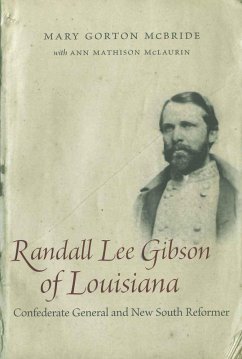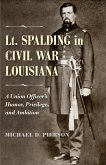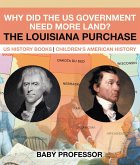Randall Lee Gibson of Louisiana offers the first biography of one of Louisiana's most intriguing nineteenth-century politicians and a founder of Tulane University. Gibson (1832--1892) grew up on his family's sugar plantation in Terrebonne Parish and was educated at Yale University before studying law at the University of Louisiana in New Orleans. He purchased a sugar plantation in Lafourche Parish in 1858 and became heavily involved in the pro-secession faction of the Democratic Party. Elected colonel of the Thirteenth Louisiana Volunteer Regiment at the start of the Civil War, he commanded a brigade in the Battle of Shiloh and fought in all of the subsequent campaigns of the Army of Tennessee, concluding in 1865 with the Battle of Spanish Fort.
As Gibson struggled to establish a law practice in postwar New Orleans, he experienced a profound change in his thinking and came to believe that the elimination of slavery was the one good outcome of the South's defeat. Joining Louisiana's Conservative political faction, he advocated for a postwar unification government that included African Americans. Elected to Congress in 1874, Gibson was directly involved in the creation of the Electoral Commission that resulted in the Compromise of 1877 and peacefully solved the disputed 1876 presidential election. He crafted legislation for the Mississippi River Commission in 1879, which eventually resulted in millions of federal dollars for flood control.
Gibson was elected to the U.S. Senate in 1880 and became Louisiana's leading "minister of reconciliation" with his northern colleagues and its chief political spokesman during the highly volatile Gilded Age. He deplored the growing gap between the rich and the poor and embraced a reformist agenda that included federal funding for public schools and legislation for levee construction, income taxes, and the direct election of senators. This progressive stance made Gibson one of the last patrician Democrats whose noblesse oblige politics sought common middle ground between the extreme political and social positions of his era. At the request of wealthy New Orleans merchant Paul Tulane, Gibson took charge of Tulane's educational endowment and helped design the university that bears Tulane's name, serving as the founding president of the board of administrators.
Highly readable and thoroughly researched, Mary Gorton McBride's absorbing biography illuminates in dramatic fashion the life and times of a unique Louisianan.
As Gibson struggled to establish a law practice in postwar New Orleans, he experienced a profound change in his thinking and came to believe that the elimination of slavery was the one good outcome of the South's defeat. Joining Louisiana's Conservative political faction, he advocated for a postwar unification government that included African Americans. Elected to Congress in 1874, Gibson was directly involved in the creation of the Electoral Commission that resulted in the Compromise of 1877 and peacefully solved the disputed 1876 presidential election. He crafted legislation for the Mississippi River Commission in 1879, which eventually resulted in millions of federal dollars for flood control.
Gibson was elected to the U.S. Senate in 1880 and became Louisiana's leading "minister of reconciliation" with his northern colleagues and its chief political spokesman during the highly volatile Gilded Age. He deplored the growing gap between the rich and the poor and embraced a reformist agenda that included federal funding for public schools and legislation for levee construction, income taxes, and the direct election of senators. This progressive stance made Gibson one of the last patrician Democrats whose noblesse oblige politics sought common middle ground between the extreme political and social positions of his era. At the request of wealthy New Orleans merchant Paul Tulane, Gibson took charge of Tulane's educational endowment and helped design the university that bears Tulane's name, serving as the founding president of the board of administrators.
Highly readable and thoroughly researched, Mary Gorton McBride's absorbing biography illuminates in dramatic fashion the life and times of a unique Louisianan.
Dieser Download kann aus rechtlichen Gründen nur mit Rechnungsadresse in A, D ausgeliefert werden.









